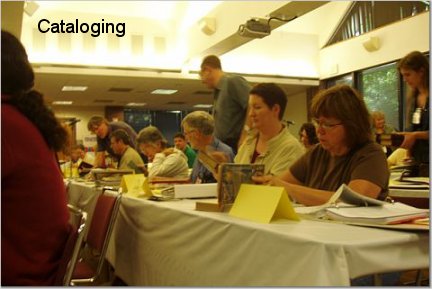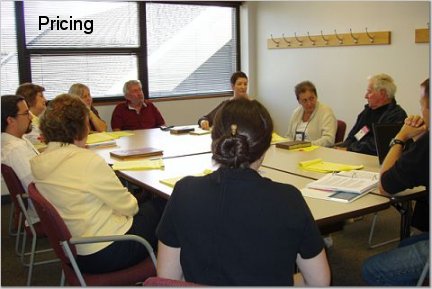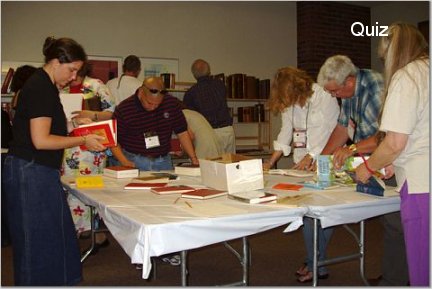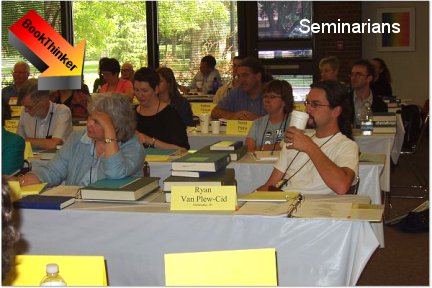

|
<<< Continued from previous page Tuesday was devoted to sessions on bibliographic descriptions (given by Terry Belanger, who else?) and how to catalog a book. Since everyone does it a bit differently, we were treated to several points of view. This segued into our each being presented with a book from Rob's shelves and told to catalog it. This was very exciting for me; learning to catalog properly was one of the main skills that I wanted to acquire, and here I had a dozen instructors, each one ready to help me with my uncertainties.

Then Dan Gregory was back again to stress the importance of images, both online and in print catalogs, to sell books. You've probably seen his work in Fine Books & Collections magazine; it was great to see his actual techniques for photographing and scanning, and to realize that good results are achievable with reasonable effort. (Be sure to check out his 3-D rotating book images at http://www.betweenthecovers.com/btc/search_results?mode=rotating. How cool is that? And no, this was not a technique that he covered.) We were allowed to eat dinner before Angela and Dan DeSimone presented a 2-hour evening tutorial on conservation and preservation, again with ample examples to aid our learning. Wednesday morning, Dan DeSimone taught us about the library market, which he knows intimately from both sides of the counter since he went to the LOC after 25 years as a dealer in the rare book trade. Ed Glaser has been on the faculty for 29 years, and he shared his secret formula for pricing books. Don't get your hopes up - although he did write a mathematical equation, complete with constants, variables, and operations on the whiteboard, it was a tongue-in-cheek reminder that pricing is art, not science. That's the secret, and the formula for success is experience and practice. Which we were about to have. It was now our turn to evaluate and price our assigned books. My insecurities were resurfacing. How was I supposed to know what price to put on this book? How foolish was I going to look when I read my catalog entry and defended my price to other seminarians? After consulting the available reference books and online sources, we sat down at roundtables of about 8-10, each with a faculty member. I happened to be with Mike Ginsberg, and my insecurities vanished. Like all members of the faculty, he seems to have an uncanny ability to recall what it was like to be new and clueless, and we were soon involved in an animated and wide-ranging discussion of "our" books and how we thought that they should be priced. At the end, we were able to consult Rob's catalog slips to see what a bona-fide ABAA dealer thought of their worth, and I emerged from the session feeling a bit more confident.

Next, Chris Volk gave us a quiz on first edition identification - a table of 10 books which we could grade on a scale of 1-5, from "I'm sure that this is a first" to "I'm sure that this is not a first." This was fun, but disconcerting: All of the reference books we needed were there, but I was again reminded of just how much there is to know, and how little of it I know - so much for my earlier elation. Luckily, she included with our notes a handy little pocket cheat sheet to first editions.

She also discussed online bookselling and available resources in some detail, and I am proud to report that she cited BookThink several times as an excellent resource. After dinner it was a field trip to Hooked on Books where owner Mary Francis Ciletti gave an "open shop" tutorial. Thursday morning the week's specialist dealer, Kevin Johnson of Royal Books told us the delightful story of his transformation from IT specialist at the CIA to antiquarian book dealer in a Baltimore row house, which set the stage for an in-depth look at how he runs his business, from sourcing to listing to selling. I am still absorbing all of the information that he shared. Mike Ginsberg followed with a discussion of auctions, and then, in the seminar tradition, we had a real auction, with Mike as our auctioneer. Items donated by the faculty are auctioned off and the proceeds donated to the local libraries that support the Seminar with their resources. This was fun - but you had to be there! Items ranged from a gourmet dinner for two with the faculty to a custom clamshell box to a signed limited edition of Kevin Johnson's soon to be published The Dark Page, a guide to the first editions that inspired American film noir of the 1940s to reference guides. Something for everyone. After lunch, Chris Volk continued to guide us through online bookselling, but this time from the buying side, and more than one war story was shared - not only the heartbreaks of the mis-described or badly shipped and how to avoid them but also the triumphs of successful arbitrage. BookHunt got a solid plug from me. Tom Congalton, proprietor of Between the Covers Rare Books moderated a roundtable discussion, with participants asking questions of the faculty. Much of the discussion centered on scouting, and this was, of the whole week, the only even slightly acrimonious session. You may recall that I mentioned that a number of FOL folks were present? Well, they were there to learn how they can maximize their own profits from bookselling. The idea of FOL volunteers checking their inventory and pricing it appropriately is very threatening to many booksellers who have long relied on such sources at dirt-cheap prices. (I should know - I'm one of them!) Well, my advice is: Be prepared - look for a symbiotic relationship with FOLs, find other sources, and learn more about books. This is the Information Age, and ISBN bookselling will not be a game of incomplete information for much longer. Soon, both sides will know the value of a given book. Yes, all of the FOLs represented were planning on acquiring scanners. In general, I think that booksellers will need to get used to paying more for stock. The standard trade rule of thumb, according to Mike Ginsburg, is that the selling price of a book is split 3 ways: 1/3 acquisition cost, 1/3 overhead, 1/3 profit. After dinner, there was a downtown bookstore tour. A bus looped half-hourly from the seminar to two downtown bookstores - Books for You and Clausen Books. Seminarians, never ones to miss opportunities to buy books, staggered off the bus with fully-laden bags, of course. Friday morning, Mike discussed scouting, sharing his tips and techniques, and Tom did a Book Show show-and-tell. We finished up with a session on appraisals with Rob and Mike, and then Brad Wahlberg, CPA, discussed taxes and accounting. Sadly, his idea of "keeping the books" just did not seem to be what bibliophiles mean by "keeping the books." I confess to succumbing to a touch of what Terry Belanger calls "MEGO" Syndrome (My Eyes Glaze Over), and I wrote a note to myself: "Keep accountant." A farewell lunch, and then, at 2:00 pm, the Colorado Antiquarian Book Seminar 2007 was officially over. I was wiped but wired, and since I was spending the night and flying out on Friday, I decided on a bit of modest scouting at a nearby Salvation Army. My $20 haul was a signed Terry Brooks first, a second printing of Mastering the Art of French Cooking, and half-a-dozen books on obscure ethnic knitting techniques - the kind of books that might just as well have dollar signs for titles. Life is good in Colorado Springs. I've been home now for over a month and had time to reflect and to begin to assimilate some of what I learned. And what did I learn? Skills and knowledge, definitely, but more importantly a deeper understanding of the antiquarian book world, and with that, a vision of what a book dealer can be - of who I could be. I now realize that I could issue a catalog, buy a collection, quote to a library, exhibit at a book fair, have a web site, write a book .... Yes, me - I could do these real bookseller things. For a look at another 2007 seminarian who has jumped right in at the deep end (putting me completely to shame!), I highly recommend reading Chris Lowenstein's blog. I have been challenged and also affirmed. After ABS I believe that I do have a fundamental book sense. I don't yet know exactly where the lessons of ABS will take me, but I know that I will have colleagues along the way and the support to achieve anything that I am willing to work for. Chris Volk's ABS List daily sustains and extends the network that the Seminar develops. For an online bookseller, this is a bit of a shock. I am more used to thinking of competitors than colleagues and mentors. I don't know how to write this without sounding trite, but the faculty members are genuinely dedicated to the success of new booksellers, and they repeatedly assured us that this is a tradition of long standing in the trade. It was very clear that they devote themselves to the Seminar because they are paying forward the support and collegiality that they have experienced, and I cannot begin to do justice to their gracious generosity. When I hear the inner echo of Mike Ginsburg's voice speaking of "the trade," I get goose bumps and feel that I belong to a tribe. Perhaps the most important thing that I learned about the tribe of booksellers is that they work very, very hard for their success, but it is very, very difficult to spot this because they always seem to be having such a very, very good time. If I ever start to feel that the hard work outweighs the satisfaction, it will be time to join another tribe. Oh yes - the big question: Was it worth it? Yes, every penny, and every minute. Is it for everyone? No, not if you see yourself primarily as a widget seller, but if you've read this far, then it probably is for you. To me, bookselling today is a lot like sailing. I can't control the elements that affect my boat. I can't change the wind, or the currents, or the coastal geography, but I can choose a seaworthy boat, trim my sails, fly a spinnaker, change my tack, check the weather report, follow the lighthouse beacons, and get to know my fellow sailors when in port. I don't know of a better way to prepare for a long and successful voyage as a book dealer than to attend the ABS. The "book time" and the "face time" that you will enjoy are incomparable. Whatever your final destination port may be, with the experience of the ABS, you are sure to enjoy a memorable journey.

When you go:
And if you can't go yet, take these simple steps to put into practice some of what I learned:
< to previous article to next article >
Questions or comments?
| Forum
| Store
| Publications
| BookLinks
| BookSearch
| BookTopics
| Archives
| Advertise
| AboutUs
| ContactUs
| Search Site
| Site Map
| Google Site Map
Store - Specials
| BookHunt
| BookShelf
| Gold Edition & BookThink's Quarterly Market Report
| DomainsForSale
| BookThinker newsletter - free
Copyright 2003-2011 by BookThink LLC
|

|
|